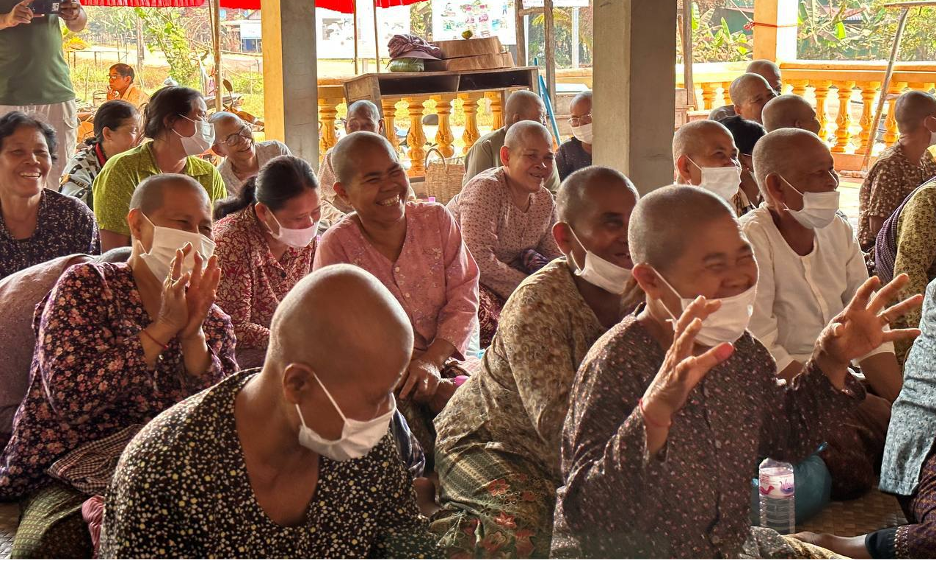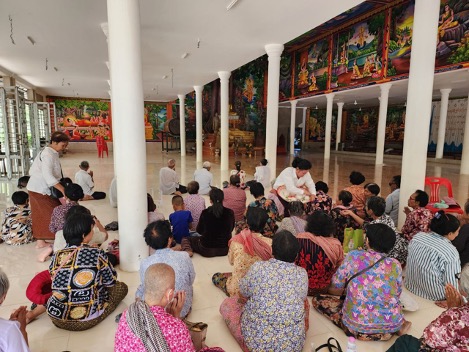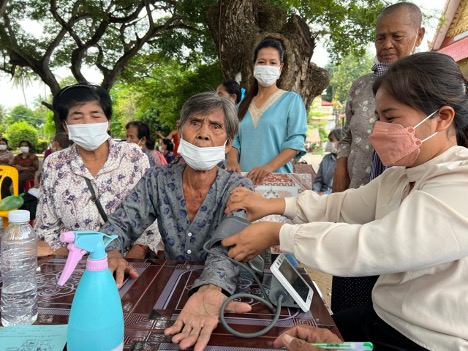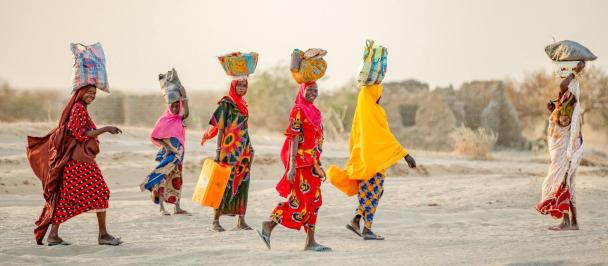By Phearak KRUY, Project Coordination Officer (Social Protection), Socio-Economic Resilience Fund, UNDP Cambodia & Chanvoitey HORN, Ageing Policy Consultant
Building a community-based social protection system
August 17, 2023

Members of Lvea Older People Association
The number of people aged over 60 in Cambodia is increasing rapidly. Between 2019 and 2050, the proportion of older people is estimated to more than double, from about 8.9 percent to 21 percent of the total population. While there has been a lot of discussion about the current youth bulge in Cambodia, there is not much policy attention to the issues of the aging population.
People are more likely to rely on family support for their well-being as they age. A study by National Institute of Social Affairs in 2021 found that 73% of older people receive remittances from their family members. The elderly, in many cases, shoulder the healthcare costs themselves, which consumes most of their savings. Households headed by the elderly suffer financial hardship due to high out-of-pocket health expenditures. A study, conducted by UNDP in 2022 on the feasibility of building an inclusive, multi-tiered old pension system in Cambodia, found that 50% of older people in Cambodia did not have a paying job, meaning that they are vulnerable to be financially dependent on others. For those older people who are perceived as an economic burden, they are in danger of exclusion, discrimination, and abuse. Older women are at higher risk, especially those living with a disability. The vulnerabilities that older people experience in terms of disability and limited access to employment, for instance, increase as they age, with those aged 75 years and above being particularly vulnerable.
Given the limited public fiscal space, religious institutions like pagodas, could provide alternate solutions to address the aging population in Cambodia. As people age, they are traditionally more likely to go to pagodas. Pagodas therefore play a vibrant and constructive role in the country’s socio-cultural structure.
A New Approach
There is a potential opportunity to build on the human and physical resources of traditional religious institutions such as pagodas to provide essential services for the well-being of older people.
With support from the governments of Australia, Korea and Luxembourg, and in collaboration with HelpAge Cambodia and the Ministry of Social Affairs, Veterans and Youth Rehabilitation (MoSVY), UNDP Cambodia is piloting an aging policy project to explore the possibility of creating a community-based social protection system by linking religious institutions with Older People Associations (OPAs), using the Intergenerational Self-help Club (ISHC) model. ISHC is a comprehensive and inclusive approach that promotes healthy longevity through a variety of interventions, ranging from carrying out social and cultural activities such as games, performances and home visits, promoting life-long learning through monthly talks, study visits and intergenerational cross-learning and sharing, improving physical health through awareness raising, healthy lifestyles, access to health screening and homecare support, to promoting self-help and livelihoods in the community.
The project, being implemented in seven provinces namely Kampong Thom, Thboung Khmum, Svay Rieng, Battambang, Preah Vihear, Siem Reap and Banteay Meanchey, aims to build on existing religious infrastructure and resources. As Cambodia has over 5,104 Buddhist pagodas with 70,905 monks nationwide, there is a huge opportunity to create a low-cost and sustainable model of OPAs by capitalizing on readily available infrastructure and Buddhist values that can bind people together to create a sense of community and intergenerational solidarity. This will serve as a low-cost option to build a model for age friendly cities and communities and contribute to the UN Decade of Healthy Ageing.
How does Pagoda-based OPAs work?
One of the primary roles of a pagoda-based OPA is to act as a community-based social protection hub where various kinds of support, care, capacity building and livelihood-strengthening activities are provided and done for the wellbeing and improved livelihood of old people. Basic healthcare services such as blood pressure monitoring, weight measurement and advice on health care are often offered at the OPA. In case where the OPA members lose their ability to move (e.g., due to disability) or are suffering from severe illness that prevents them from travelling to the OPAs and thus require healthcare support at home, there is also a community-based homecare support service. This is often done by elderly members of the OPAs themselves who take turn in taking care of one another and/or with the support of the young volunteers in the community. In addition, funds to support income-generating activities in the form of revolving loans are also available for OPA members to access, with which they can further invest in their livelihood activities such as livestock raising and crop production. These funds are managed by the OPAs themselves and serve as the core fund to support the OPA operation.
Pagoda-based OPAs also help close the intergenerational gap and promote a sense of community and solidarity. This is done through the integration of the OPAs with the Buddhist pagodas. In addition to using pagodas as a meeting spot for their monthly gatherings, the OPAs also use pagodas as a place where their members can learn about the Buddhist values, practices, and teachings, which in turn help strengthen and revitalize the sense of belonging, community and solidarity.

Members of Pagoda-based OPA in Phnom Touch (Banteay Meanchey) receiving the dharma
Phnom Touch Older People Association, located in the Banteay Meanchey province, is one of the pagoda-based OPAs under our project pilot. Most of the members live less than 2 kilometres away from the pagoda.
To enhance their access to primary healthcare, all the members gather at the pagoda once a month to exercise together, engage in health awareness talks, and conduct essential monthly health monitoring. During one of our visits, the members underwent blood monitoring which revealed that about half of them suffer from high blood pressure.
To strengthen older people's livelihoods and increase their access to financial capital, the pagoda-based OPA in Phnom Touch also partners with local NGOs to train and support their members in income-generating activities, such as rice and cow banks. Moreover, the OPA has a revolving fund with a lifetime membership price of 50,000 riels (US$ 12). Currently, the overall capital of the OPA is 18 million riels, and members can access this fund to support their income-generating activities and cope with financial shocks. This revolving fund can also generate a revenue stream for the OPA through the interests generated from the fund. The OPA then can use this form of revenue to cover their operational costs and support their various activities, hence creating sustainability. The revolving fund model can also be applied in any other OPAs in the country.
What’s Next?
The needs of older people are often overlooked and underrepresented in the public policy discourse. It is important to remember that the concept of 'Leave No One Behind' also includes the elderly. Stereotyping elderly as the family's and society's economic burdens therefore needs to be urgently addressed. The older generation deserves to feel included in our society and for that they need to receive the support and care they deserve.
Linking the community of older people with pagodas could offer a new way to build a sense of belonging and solidarity in the community and rebuild fraying social fabric while at the same time empowering old people to contribute to their own healthy and meaningful lives.
The involvement of younger people in the OPAs is critical. Young people can play a key role in promoting a vibrant intergenerational OPA development based on the Intergenerational Self-Help Model. In this respect, young people could play a more active role in community volunteerism which could benefit them personally, but also ensure the sustainability of the pagoda-based OPAs in Cambodia.
To drive this agenda forward, UNDP will continue working with the government to explore other policy options and initiatives to support, promote and protect the wellbeing of older Cambodians.

Members of Pagoda-based OPA in Phnom Touch offering blood monitoring service for their members

 Locations
Locations


